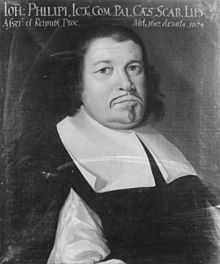Johann Philippi (legal scholar)
Johann Philippi (born March 9th July / March 19, 1607 greg. In Waldau ; † April 21, 1674 in Leipzig ) was a German legal scholar.
Life
Johann was born as the son of the church and court clerk Josias Philippi and his wife Ursula Cloß. His father had acquired citizenship in Liegnitz , where Johann attended the city school until he was thirteen. He then enjoyed three years of lessons from private tutors and in 1623 attended the Elisabethgymnasium in Breslau . In 1625 he went to the University of Leipzig , studied philosophy with Zacharias Schneider (1592–1664), Philipp Müller (1585–1659), Andreas Corvinus (1589–1648) and Wilhelm Avianus (–1636). In addition, he attended the legal lecturesSigismund Finckelthaus , Wilhelm Schmuck (1575–1634), Johann Böhme (–1645), Bartholomäus Gölnitz (1557–1635) and David Lindner (1604–1644).
In 1631 he returned to Liegnitz, where he himself became tutor to some nobles. Some of his students accompanied him to the Leipzig University in 1635, where he himself continued his legal studies with Quirinus Schacher . In the Thirty Years' War , he lost all his possessions, put nevertheless in 1637 his studies at the University of Jena , where he the licentiate acquired in law and on 30 November of that year with the disputation De curatore Bonorum the doctor of the rights doctorate .
He then returned to Leipzig in 1640, completed his habilitation on February 8, 1640 at the law faculty as a substitute for Finckelthaus, held legal lectures, became an advocate at the Leipzig Consistory in 1644 (until 1666), and was an advocate at the Saxon High Court in Leipzig in 1645 (until 1672 ), became a member of the College of B. Mariae Virgin in 1646 (with a dispensation from the Leipzig Mag. phil.), in October 1648 he became an assessor at the Faculty of Law (until 1657). In 1650 he was drawn into the Leipzig council and in 1657 rose to the electoral Schöppenstuhl .
After he had received a position as assessor of the estates at the regional court of the margraviate of Niederlausitz in 1654 , he became imperial palatine count in 1651 (Comitiv in amplissima forma). Philippi had also participated in the organizational tasks of the Leipzig University. He was a senior of the Polish nation, was prorector in 1642 and rector of the alma mater in 1652 .
Johann Philippi was buried on April 27, 1674 in the Paulinerkirche in Leipzig .
family
From his marriage on February 28, 1638 to Maria, daughter of the Leipzig trader David Bock, six sons and two daughters have emerged. From the children we know:
- Christian Philippi Baden-Durlach secret secretary, at the imperial court in Vienna
- Maria Dorothea († as a child)
- Johann David Philippi was in the Swedish military service
- Josias Philippi studied law
- Johanna Maria Philippi married Wilhelm Romanus (1644–1688) in 1668
- Friedrich Philippi (1650-1724) became a lawyer
- Sigismund Philippi was at the electoral high school in Pforta
- Theodorus Philippi
Fonts
As an author, he mainly talked about Saxon land law. He has also published numerous disputations on various legal issues that other authors have subsequently taken up.
- Usus jur. practicum Institutionum Justinianearum. Leipzig 1665, 1677, 1698
- Tractatus de subhastationibus, ad usum practicum utriusque fori, potissimum Saxonici, directus Leipzig 1667, 1688
- Observationes Juris practicae: Ex Decisionibus Electoralibus Saxonicis Casuum Juris Dubiorum Anno 1661 Promulgatis Collectae; Ac Praemisso Cujusvis Decisionis Textu Germanico Et Latino, Celebriorum Dicasteriorum praejudiciis exornatae. Leipzig 1670, 1694, 1710
- Considerationes juridic in novam processum judic. Saxonic. De anno 1622. Halle (Saale) 1674, Leipzig 1686, 1674
- Questiones jurid. Ex Phillipi processu. 1671
- Controversias juris decisas.
- Conclusiones ex materia societatis cet.
- Disp. De contractibus.
- Disp. De obligationibus in genre.
- Disp. De carceribus.
- Disp. De eo, qoud interest.
- Disp. De juramento judiciali.
- Disp. De juris principiis atque praecipuis.
- Disp. De legitimatione.
- Disp. De solutione. 1655
- Disp. De testamentis.
- Disp. juridica de crimine læsæ majestatis divinæ et humanæ. 1651
- Disp. De curatione bonorum.
- Disp. De fidejustione. Leipzig 1653
- Disp. De injuriis et famosis libellis. 1653
- Disp. De jure tutelarum. Leipzig 1656
- Disp. Analysis L. Nesenius 24 f de neg. Gest. Et c.
literature
- Johann August Ritter von Eisenhart : Philippi, Johann . In: Allgemeine Deutsche Biographie (ADB). Volume 26, Duncker & Humblot, Leipzig 1888, p. 76.
- Philippi or Philips, Johann. In: Johann Heinrich Zedler : Large complete universal lexicon of all sciences and arts . Volume 27, Leipzig 1741, column 1942 f.
- Johann Ulrich Mayer: The beautiful white Easter dress / Which according to the pattern provided from the following words from Job's Cap. XXVII. v. 4. 5. 6. My lips should not speak anything wrong / [et] c .: Bey ... rendering of the last honorary service to ... Mr. Johann Philippi / IurisConsulto, Comiti Palatino Caesareo, des Churfl. Saxon. Schöppenstuhls all here… Assessori… After the 1674th year of his soul, which ended April 21st… the dress of glory put on / but his body was put into the grave chamber on the 27th of the same month / For those present Easter hearts… laid. In: Fritz Roth : Complete evaluations of funeral sermons and personal documents for genealogical purposes. Self-published, Boppard / Rhein 1959, Volume 1, p. 3, R 9
- Emil Friedberg: One hundred years from the doctor's book of the Leipzig Faculty of Law 1600–1700. Edelmann, Leipzig 1887, p. 16, no.202
- Christian Gottlieb Jöcher : General scholarly lexicon. Volume 3: M-R. Gleditsch, Leipzig 1751, Sp. 1118–1119 ( Google books )
Web links
| personal data | |
|---|---|
| SURNAME | Philippi, Johann |
| BRIEF DESCRIPTION | German legal scholar |
| DATE OF BIRTH | March 19, 1607 |
| PLACE OF BIRTH | Waldau near Liegnitz |
| DATE OF DEATH | April 21, 1674 |
| Place of death | Leipzig |
